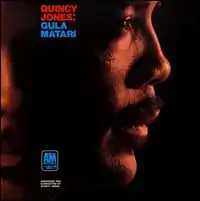| Gula Matari | ||||
|---|---|---|---|---|
 | ||||
| Studio album by | ||||
| Released | 1970 | |||
| Recorded | March 25–26 and May 12, 1970 | |||
| Studio | Van Gelder Studios, Englewood Cliffs, NJ | |||
| Genre | Jazz | |||
| Length | 34:54 | |||
| Label | A&M | |||
| Producer | Creed Taylor | |||
| Quincy Jones chronology | ||||
| ||||
| Review scores | |
|---|---|
| Source | Rating |
| Allmusic | |
| The Penguin Guide to Jazz Recordings | |
Gula Matari is a 1970 studio album by Quincy Jones.[3]
Track listing
- "Bridge over Troubled Water" (Paul Simon) – 5:09
- "Gula Matari" (Quincy Jones) – 13:02
- "Walkin'" (Jimmy Mundy, Richard Carpenter) – 8:02
- "Hummin'" (Nat Adderley) – 8:08
Personnel
- Pepper Adams - baritone saxophone
- Danny Bank - bass and baritone saxophones
- Hubert Laws - flute solos
- Jerome Richardson - soprano saxophone solos
- Freddie Hubbard, Danny Moore, Ernie Royal, Marvin Stamm, Gene Young - trumpet/flugelhorn
- Wayne Andre - trombone
- Al Grey - trombone solos
- Toots Thielemans - guitar and whistle solo
- Herbie Hancock, Bob James, Bobby Scott - keyboards
- Grady Tate - drums
- Don Elliott - bass marimba on "Gula Matari"
- Jimmy Johnson, Warren Smith - percussion
- Ray Brown - bass
- Ron Carter - bass on "Gula Matari"
- Richard Davis - bass on "Gula Matari"
- Major Holley - bass and voice solo
- Milt Jackson - vibes
- Seymour Barab, Kermit Moore, Lucien Schmit, Alan Shulman - cello
- Valerie Simpson, Marilyn Jackson, Maretha Stewart, Barbara Massey, Hilda Harris - vocals
Performance
- Quincy Jones - arranger, conductor
- Pete Turner - photography
References
- ↑ Allmusic review
- ↑ Cook, Richard; Morton, Brian (2008). The Penguin Guide to Jazz Recordings (9th ed.). Penguin. p. 798. ISBN 978-0-141-03401-0.
- ↑ Gula Matari at AllMusic
This article is issued from Wikipedia. The text is licensed under Creative Commons - Attribution - Sharealike. Additional terms may apply for the media files.